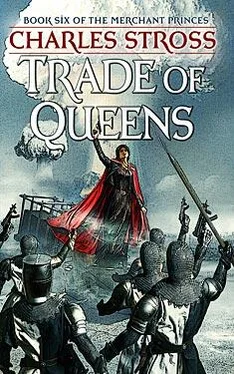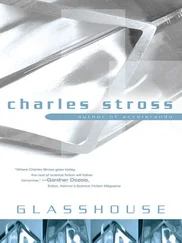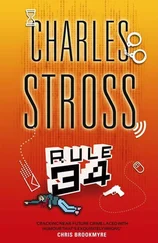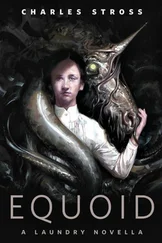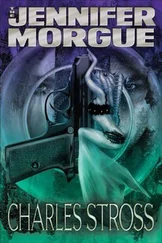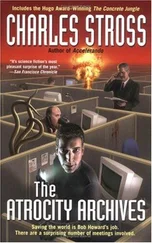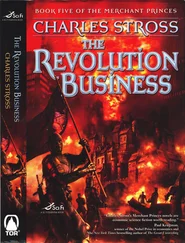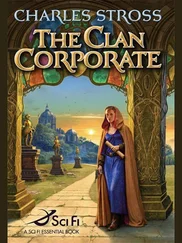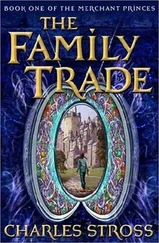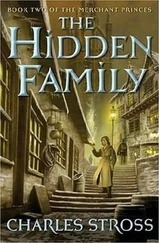Charles Stross - MP 6 -The Trade of Queens
Здесь есть возможность читать онлайн «Charles Stross - MP 6 -The Trade of Queens» весь текст электронной книги совершенно бесплатно (целиком полную версию без сокращений). В некоторых случаях можно слушать аудио, скачать через торрент в формате fb2 и присутствует краткое содержание. Жанр: Старинная литература, на английском языке. Описание произведения, (предисловие) а так же отзывы посетителей доступны на портале библиотеки ЛибКат.
- Название:MP 6 -The Trade of Queens
- Автор:
- Жанр:
- Год:неизвестен
- ISBN:нет данных
- Рейтинг книги:4 / 5. Голосов: 1
-
Избранное:Добавить в избранное
- Отзывы:
-
Ваша оценка:
- 80
- 1
- 2
- 3
- 4
- 5
MP 6 -The Trade of Queens: краткое содержание, описание и аннотация
Предлагаем к чтению аннотацию, описание, краткое содержание или предисловие (зависит от того, что написал сам автор книги «MP 6 -The Trade of Queens»). Если вы не нашли необходимую информацию о книге — напишите в комментариях, мы постараемся отыскать её.
MP 6 -The Trade of Queens — читать онлайн бесплатно полную книгу (весь текст) целиком
Ниже представлен текст книги, разбитый по страницам. Система сохранения места последней прочитанной страницы, позволяет с удобством читать онлайн бесплатно книгу «MP 6 -The Trade of Queens», без необходимости каждый раз заново искать на чём Вы остановились. Поставьте закладку, и сможете в любой момент перейти на страницу, на которой закончили чтение.
Интервал:
Закладка:
Maybe if I hadn't asked the colonel, weeks ago,
he speculated. Colonel Smith was Air Force, on secondment to FTO by way of a posting with NSA. He understood chains of command and accountability and what to do about illegal orders. Not like that shadowy spook-fucker, Dr. James.
But they blew up my car.
They'd
expected
him to run somewhere. Smith might already be dead.
If I'd smuggled some of the tapes
out—tapes of conversations in hochsprache, recorded by someone with access to the Clan's innermost counsels—but that was nuts, too. The whole setup in that office was designed to prevent classified materials from going AWOL.
Where do I go, now?
Tired and sweaty and stressed and just a little bit numb from the bourbon, Mike sank back against the headboard and stared at the TV screen. Two diagonal columns of smoke, one of them almost forming the classic mushroom, the other bent and twisted out of recognizable shape. Again and again, the Washington Monument's base blasted sideways out from under it, the peak falling. Helicopter footage of the rubble, now, eight- and nine-story office blocks stomped flat as if by a giant's foot. Preliminary estimates of the death toll already saying it was worse than 9/11, much worse. Anchormen and women looking shocked and almost human under their makeup, idiotically repeating questions and answers, hunting for meaning in the meaningless. Interviews with a survivor on a gurney, bandaged around one side of their head, medevac'd to a hospital in Baltimore.
What's left that I can do?
The vice president, somber in a black suit—someone had found a mourning armband for him somewhere—mounting a stage and standing behind a lectern. Balding, jowly, face like thunder as he answered questions in a near-constant waterfall of flashbulb flickering. Promising to find the culprits and punish them. Make them pay. This man whom the Clan's consigliere had named as their West Coast connection. A whey-faced Justice Scalia stepping forward to administer the oath of office. President WARBUCKS. Dire warnings about the Middle East. Appeals for national unity in the face of this terrorist threat. Promises of further legislation to secure the border. State of emergency. State of complicity.
Where can I run?
Mike lifted his glass and took another mouthful. Knowing too much about the Family Trade Operation was bad enough; knowing too much about the new president's darker secrets was a one-way ticket to an unmarked roadside grave, sure enough. And the hell of it was, there was probably no price he could pay that would buy his way back in, even if he
wanted
in on what looked like the most monstrously cynical false-flag job since Hitler faked a Polish army attack on his own troops in order to justify the kickoff for the Second World War.
I need to be out of this game,
he realized blearily. Preferably in some way that would defuse the whole thing, reduce the risk of escalation.
Stop them killing each other, somehow.
It seemed absurdly, impossibly utopian, as far beyond his grasp as a mission to Mars. So he took another sip of bourbon. He had a lot of driving to do tomorrow, and he needed a good night's sleep beforehand, and after what he'd seen today . . . it was almost enough to make him wish he smoked marijuana.
Even revolutions need administration: And so the cabinet meeting rooms in the Brunswick Palace in New London played host to a very different committee from the nest of landowning aristocrats and deadwood who'd cluttered John Frederick's court just three months earlier. They'd replaced the long, polished mahogany table in the Green Receiving Room with a circular one, the better to disguise any irregularities of status, and they'd done away with the ornate seat with the royal coat of arms; but it was still a committee. Sir Adam Burroughs presided, in his role as First Citizen and Pastor of the Revolution; as for the rest of them . . .
Erasmus arrived late, nearly stepping on the heels of Jean-Paul Dax, the maritime and fisheries commissioner. "My apologies," he wheezed. "Is there a holdup?"
"Not really." Dax stepped aside, giving him a sharp glance. "I see your place has moved."
"Hmm." Burgeson had headed towards his place at the right of Sir Adam's hand, but now that he noticed, the engraved nameplates on the table had been shuffled, moving him three seats farther to the right. "A mere protocol lapse, nothing important." He shook his head, stepping over towards his new neighbors: Maurits Blanc, commissioner of forestry, and David McLellan, first industrial whip. "Hello, David, and good day to you."
"Not such a good day. . . ." McLellan seemed slightly subdued as Erasmus sat down. He directed his gaze at the opposite side of the round table, and Erasmus followed:
Not much chivalry on display there,
he noticed. A tight clump of uniforms sat to the left of Sir Adam: Reynolds, along with Jennings from the Justice Directorate, Fowler from Prisons and Reeducation, and a thin-faced fellow he didn't recognize—who, from his attitude, looked to be a crony of Reynolds's. A murder of crows, seated shoulder-to-shoulder: What kind of message was
that?
"Is Stephen feeling his oats?" Erasmus murmured, for McLellan's ears only.
"I have no idea." Burgeson glanced at him sharply: McLellan's expression was fixed, almost ghostly. Erasmus would have said more, but at that precise moment Sir Adam cleared his throat.
"Good morning, and welcome. I declare this session open. I would like to note apologies for absence from the following commissioners: John Wilson, Electricity, Daniel Graves, Munitions—" The list went on. Erasmus glanced around the table. There were, indeed, fewer seats than usual—a surprise, but not necessarily an unwelcome one: the cumbersome size of the revolutionary cabinet had sometimes driven him to despair.
"Now, to the agenda. First, a report on the rationing program. Citizen Brooks—"
Erasmus was barely listening—making notes, verging on doodles, on his pad—as the discussion wandered, seemingly at random, from department to department. He knew it was intentional, that Sir Adam's goal to was to insure that everyone had some degree of insight into everyone else's
business—transparency,
he called it—but sometimes the minutiae of government were deathly boring; he had newspapers and widecasters to run, a nagging itch to get out in front and cultivate his own garden. Nevertheless he sat at ease, cultivating stillness, and trying to keep at least the bare minimum of attention on the reports. Tone was as important as content, he often felt: You could often tell fairly rapidly if someone was trying to pull the wool over your eyes, simply by the way they spun out their words.
It was halfway through Fowler's report that Erasmus began to feel the first stirrings of disquiet. "Construction of new reeducation centers is proceeding apace"—Fowler droned portentously, like a well-fed vicar delivering a slow afternoon sermon—"on course to meet the goal of one center per township with a population in excess of ten thousand. And I confidently expect my department to be able to meet our labor obligation to the Forestry Commission and the Departments of Mines and Transport—"
Did I just hear that?
Burgeson blinked, staring at Fowler and his neighbors.
Did I just hear the minister for prisons boast that he was supplying labor quotas to mines and road-building units?
The skin on the back of his neck crawled. Yes, there were a lot of soldiers in the royalist camp, and many prisoners of war—and yes, there was a depression-spawned crime wave—but handing a profit motive to the screws stuck in his throat. He glanced around the table. At least a third of the commissioners he recognized had done hard time in the royal labor camps. Yet they just sat there while Fowler regurgitated his self-congratulatory litany of manacles refastened and windows barred.
Читать дальшеИнтервал:
Закладка:
Похожие книги на «MP 6 -The Trade of Queens»
Представляем Вашему вниманию похожие книги на «MP 6 -The Trade of Queens» списком для выбора. Мы отобрали схожую по названию и смыслу литературу в надежде предоставить читателям больше вариантов отыскать новые, интересные, ещё непрочитанные произведения.
Обсуждение, отзывы о книге «MP 6 -The Trade of Queens» и просто собственные мнения читателей. Оставьте ваши комментарии, напишите, что Вы думаете о произведении, его смысле или главных героях. Укажите что конкретно понравилось, а что нет, и почему Вы так считаете.
